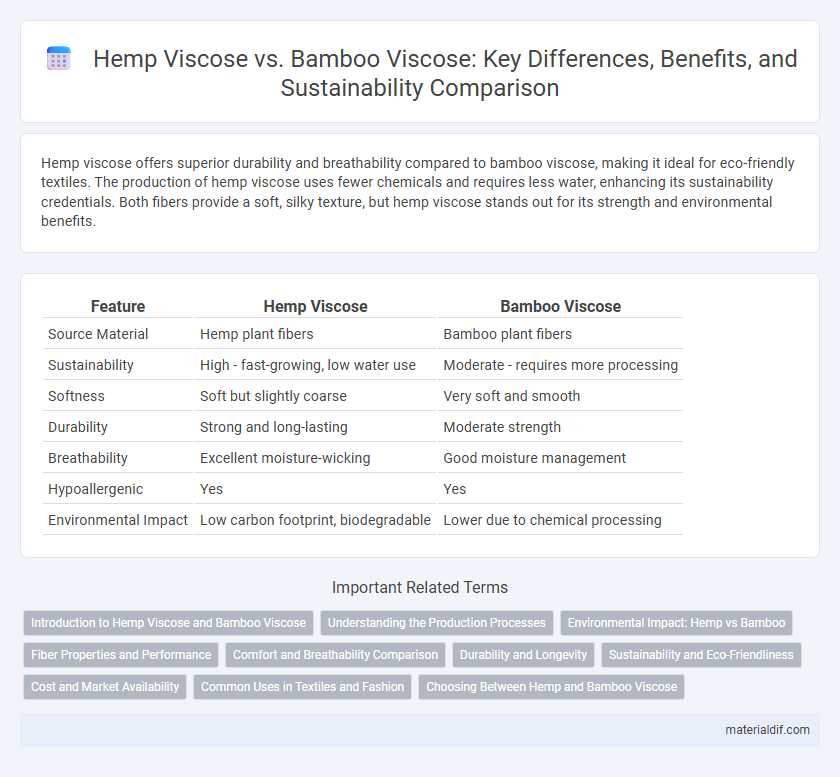Hemp viscose offers superior durability and breathability compared to bamboo viscose, making it ideal for eco-friendly textiles. The production of hemp viscose uses fewer chemicals and requires less water, enhancing its sustainability credentials. Both fibers provide a soft, silky texture, but hemp viscose stands out for its strength and environmental benefits.
Table of Comparison
| Feature | Hemp Viscose | Bamboo Viscose |
|---|---|---|
| Source Material | Hemp plant fibers | Bamboo plant fibers |
| Sustainability | High - fast-growing, low water use | Moderate - requires more processing |
| Softness | Soft but slightly coarse | Very soft and smooth |
| Durability | Strong and long-lasting | Moderate strength |
| Breathability | Excellent moisture-wicking | Good moisture management |
| Hypoallergenic | Yes | Yes |
| Environmental Impact | Low carbon footprint, biodegradable | Lower due to chemical processing |
Introduction to Hemp Viscose and Bamboo Viscose
Hemp viscose and bamboo viscose are both sustainable fibers derived from natural plants, transforming hemp stalks and bamboo pulp into soft, breathable fabrics ideal for eco-friendly textiles. Hemp viscose is valued for its durability, moisture-wicking properties, and resistance to UV light, making it suitable for activewear and durable garments. Bamboo viscose offers exceptional softness and natural antibacterial qualities, often preferred for comfortable, skin-friendly apparel and home textiles.
Understanding the Production Processes
Hemp viscose is produced by chemically processing hemp fibers, which are derived from the stalks of the hemp plant, resulting in a sustainable and strong regenerated cellulose fiber. Bamboo viscose involves a similar chemical process applied to bamboo pulp, but often relies on intensive solvents such as sodium hydroxide and carbon disulfide. Understanding these production methods highlights that while both hemp and bamboo viscose share similar manufacturing steps, the raw material source and environmental impacts differ significantly.
Environmental Impact: Hemp vs Bamboo
Hemp viscose production consumes significantly less water and requires fewer pesticides compared to bamboo viscose, making it a more environmentally sustainable choice. Hemp plants grow rapidly with minimal irrigation and improve soil health through natural nutrient cycling, while bamboo cultivation often involves intensive chemical treatments and deforestation concerns. Lifecycle assessments reveal that hemp viscose generates lower carbon emissions and reduces ecological damage, promoting a smaller overall environmental footprint than bamboo viscose.
Fiber Properties and Performance
Hemp viscose offers superior durability and breathability compared to bamboo viscose, making it ideal for high-performance textiles. Its natural antimicrobial properties and moisture-wicking capabilities enhance comfort and reduce odor, while bamboo viscose tends to be softer but less resilient under repeated wear and washing. Fiber strength in hemp viscose contributes to longer garment life and better resistance to pilling, distinguishing it from the more delicate bamboo viscose fibers.
Comfort and Breathability Comparison
Hemp viscose offers superior moisture-wicking properties and enhanced breathability compared to bamboo viscose due to its natural fiber structure, promoting better airflow and moisture management. The durability of hemp viscose contributes to long-lasting comfort, maintaining softness even after multiple washes. Bamboo viscose, while soft and silky, tends to retain more moisture, which may reduce overall breathability in hot or humid conditions.
Durability and Longevity
Hemp viscose outperforms bamboo viscose in durability and longevity due to its naturally strong fibers that resist wear and tear, making it ideal for long-lasting textiles. The high tensile strength of hemp viscose ensures fabrics maintain their integrity and appearance even after repeated washing and heavy use. In contrast, bamboo viscose tends to degrade faster under stress and frequent laundering, reducing its overall lifespan.
Sustainability and Eco-Friendliness
Hemp viscose is highly sustainable due to hemp's rapid growth, low water usage, and minimal need for pesticides, which significantly reduces its environmental impact compared to bamboo viscose. Bamboo viscose requires extensive chemical processing and large amounts of water, increasing its ecological footprint despite the plant's natural renewability. Choosing hemp viscose supports eco-friendly textile production by leveraging hemp's inherent environmental benefits and reducing chemical pollution.
Cost and Market Availability
Hemp viscose is generally more expensive than bamboo viscose due to the higher cultivation and processing costs associated with hemp fibers. Bamboo viscose benefits from widespread availability and lower production costs, making it more accessible in the textile market. Market demand for sustainable fabrics drives varying supply chains, but bamboo viscose remains the more cost-effective and readily available option compared to hemp viscose.
Common Uses in Textiles and Fashion
Hemp viscose is widely used in sustainable fashion for creating durable, breathable fabrics ideal for casual wear, denim, and outerwear, valued for its strength and moisture-wicking properties. Bamboo viscose is favored for soft, silky textiles such as lingerie, activewear, and luxurious drapes due to its smooth texture and natural antibacterial qualities. Both fibers serve eco-conscious clothing brands seeking biodegradable, renewable alternatives to traditional cotton and synthetic fabrics.
Choosing Between Hemp and Bamboo Viscose
Hemp viscose offers superior durability and eco-friendliness due to hemp's rapid growth and minimal pesticide use compared to bamboo viscose, which often involves intensive chemical processing despite bamboo's fast-growing nature. The breathability and moisture-wicking properties of hemp viscose excel in textiles aimed at sustainability-conscious consumers, whereas bamboo viscose provides a softer texture favored in luxury fabrics but may have a higher environmental footprint. Selecting between hemp and bamboo viscose depends on prioritizing either environmental impact and fabric resilience (hemp) or silky softness and comfort (bamboo).
Hemp Viscose vs Bamboo Viscose Infographic

 materialdif.com
materialdif.com